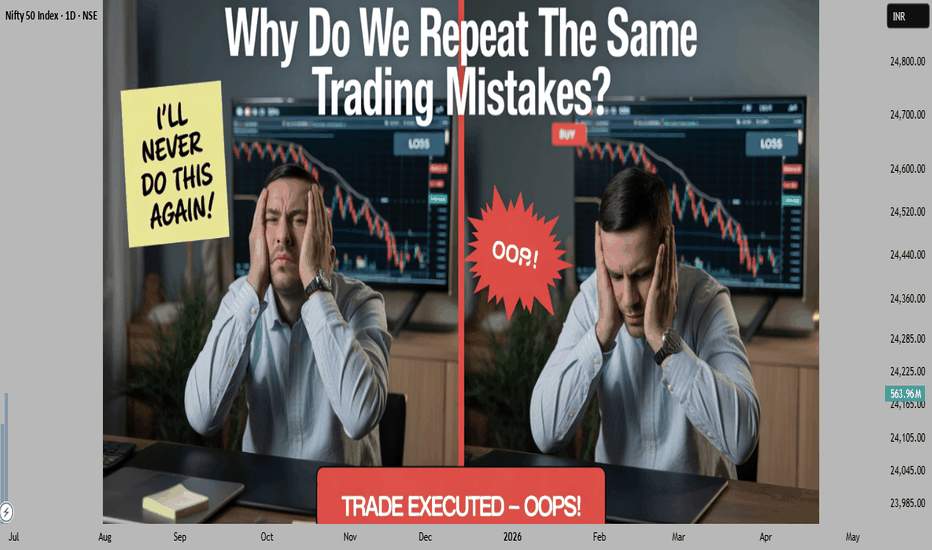Why Traders Repeat the Same Mistake – Even After Learning It?Hello Traders!
Have you ever promised yourself never to make the same trading mistake again — only to repeat it the very next week? You’re not alone. Many traders fall into the same traps over and over, even after they've studied the market and analysed their errors. Let’s break down why this happens , and how to break the cycle for good.
The Psychology Behind Repeating Mistakes
Emotions Override Logic: Even with knowledge, fear, greed, and FOMO (Fear of Missing Out) can hijack decision-making during live trades.
Lack of Process: Knowing the mistake is one thing. Having a written system or checklist to avoid it is another. Most traders skip this step.
No Real Accountability: Without a trading journal or a coach, it’s easy to forget or justify repeated bad behaviour.
Instant Gratification Bias: Humans are wired for short-term rewards. That’s why revenge trading or over-leveraging feels “right” in the moment, even when we know it’s wrong.
Rahul’s Tip
You can’t grow as a trader until you respect your own rules like a professional . Treat trading like a business — track, reflect, and correct every decision.
How to Break the Cycle
Use a Trading Journal: Write down every trade—entry, exit, emotion, and lesson. Over time, patterns become obvious and fixable.
Create a Pre-Trade Checklist: Don’t trade until your setup and risk criteria are met. This helps remove impulsive entries.
Limit Screen Time: More screen time often leads to more mistakes. Only watch the market during high-probability setups.
Have an Accountability Partner: Whether a mentor or trading buddy — feedback makes you honest and consistent.
Conclusion:
Learning is not enough. Rewiring behaviour is the real challenge. If you’re repeating mistakes, it’s not because you’re not smart — it’s because you haven’t built systems that protect you from your own emotions. Fix that, and your results will transform.
What’s the mistake you’ve repeated the most in your journey? Drop it in the comments so we can all learn and grow together!
Selfawareness
Trading Journal: The Habit That Separates Winners from Losers!Hello Traders!
Ever wonder why some traders consistently grow while others repeat the same mistakes for years? It’s not just about strategies — it’s about self-awareness . And nothing builds that better than maintaining a Trading Journal .
If you're serious about improving in trading, this habit alone can be your game-changer.
What is a Trading Journal?
A logbook of your trades — not just entries and exits, but your thinking, emotions, market context, and outcomes.
More than numbers — it captures your mindset, mistakes, missed opportunities, and lessons.
Used by professionals — almost every successful institutional or full-time trader maintains some form of journal.
What Should You Record in Your Journal?
Date: Trade taken date
Symbol / Index: Stock or Index name
Trade Type: Options / Futures / Equity
Entry / Exit Level: Price at which trade was executed
SL / Target: Planned stoploss and target levels
Qty: Quantity traded
Direction: Long / Short
Strategy Used: E.g. VWAP Bounce, Reversal Setup, Gamma Zone, etc.
Emotional State: Mindset during trade (honest reflection)
Outcome: Profit / Loss / Breakeven
Mistake / Learning Point: What did you learn?
Screenshot Link: (Optional – chart for review)
Why Journaling Works Like Magic
Reveals Patterns: You’ll spot repetitive mistakes or winning setups.
Builds Discipline: Helps you follow your plan instead of emotional reactions.
Boosts Confidence: Reviewing past successful trades gives mental clarity.
Speeds Up Growth: Traders who journal improve 2x faster — because they actually learn from their trades.
Rahul’s Tip
You don’t need fancy tools — even a Google Sheet or Notion page works. The key is consistency and honesty . And if possible, attach a screenshot with markups for each trade — it’s worth gold during review.
Conclusion
If you're not journaling, you're just guessing. Start this habit from today and see how fast your trading mindset evolves. This is the edge nobody talks about — but every winner quietly uses.
Do you maintain a trading journal? Or plan to start now? Let’s talk below!
Stop Blaming the Market – Fix This First!Hello Traders!
Let’s be honest — we’ve all blamed the market after a losing trade.
But here’s the truth: The market is never wrong, our approach is. Before pointing fingers at volatility, news, or “manipulation,” take a step back and ask yourself: Am I following a system, or just gambling with hope?
Let’s explore what you really need to fix first — and how doing so can turn your trading around!
What to Fix Before Blaming the Market
Lack of a Trading Plan:
No entry/exit rules, no position sizing, no risk management = pure chaos. The market didn’t cause your loss—your lack of structure did.
Emotional Trading:
Taking revenge trades, FOMO entries, or holding losses in hope? That’s not the market—it’s your emotions taking over.
Overtrading Without Edge:
If you're trading every candle that moves without a tested edge, you're not trading — you're guessing.
Ignoring Risk Management:
Are you risking more than 1-2% per trade? Then one bad day can wipe out weeks of profits.
No Journaling or Self-Review:
If you’re not reviewing your past trades, you’ll keep repeating the same mistakes—blaming the market each time.
Rahul’s Tip
The market owes you nothing. It rewards discipline, patience, and consistency—not complaints. Fix your mindset and process, and the results will follow.
Conclusion
Before blaming the market again, look within.
Master yourself, and you’ll master the charts. It’s not about fighting the market—it’s about flowing with it, with a solid plan in hand.
Have you caught yourself blaming the market recently? What did you learn from it? Let’s share and grow in the comments!


